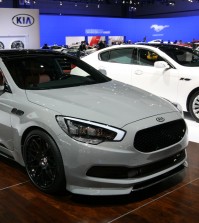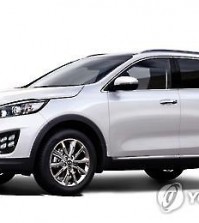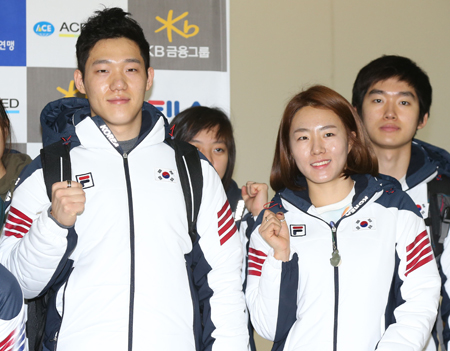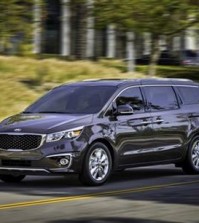- California Assembly OKs highest minimum wage in nation
- S. Korea unveils first graphic cigarette warnings
- US joins with South Korea, Japan in bid to deter North Korea
- LPGA golfer Chun In-gee finally back in action
- S. Korea won’t be top seed in final World Cup qualification round
- US men’s soccer misses 2nd straight Olympics
- US back on track in qualifying with 4-0 win over Guatemala
- High-intensity workout injuries spawn cottage industry
- CDC expands range of Zika mosquitoes into parts of Northeast
- Who knew? ‘The Walking Dead’ is helping families connect
Olympic ad war revving up

Samsung Electronics just launched its “Galaxy Supporters” ad campaign featuring Olympians such as Kim Ki-hoon, from left, Sung Shi-baek, Park Tae-hwan, Chun Lee-kyung, and Jegal Sung-yeol. They are running toward Sochi. (Courtesy of Samsung Electonics / Newsis)

Reigning Olympic speed skating champion Lee Sang-hwa poses with a Kia Motors’ K5 sedan in the automaker’s latest TV commercial. Many companies are ratcheting up their sports marketing efforts ahead of global sporting events. (Courtesy of Kia Motors)
By Kim Tae-jong
Major Korean companies are ratcheting up their sports marketing efforts by sponsoring upcoming global events in a bid to boost sales and enhance their brand image.
The Sochi Winter Olympic Games will take place in Russia from Feb. 7-23, followed by the FIFA World Cup in Brazil from June 13-July 7. Then, Incheon hosts the 17th Asian Games Sept. 19-Oct. 4.
Ahead of the three major sporting events, many companies have become official sponsors of events, organizations, teams or individual athletes, expecting direct or indirect benefits. Some are planning promotional events linked to sports or top players.
Samsung Electronics paid $100 million to become one of the 10 Olympic Partners of the International Olympic Committee (IOC).
Being an official sponsor of an international sporting event comes with enormous benefits. For example, Samsung’s brand value was estimated at $3.1 billion in 1999 but jumped to $39.6 billion last year.
The enhanced brand awareness is often said to be partially attributed to continuing exposure of the brand through various sports marketing activities, as well as enhanced productivity of the firm’s products. The market share of Samsung’s mobile phones in China jumped to 21.2 percent in 2009 from 11.4 percent in the previous year, after the Beijing Olympic Games in which Samsung held various marketing events as an Olympic Partner.
The company has launched an advertising campaign at home and abroad for the upcoming Winter Olympics. It has created the Samsung GALAXY Team, consisting of top athletes, to promote the Olympic spirit around the world.
Samsung Electronics is also an official sponsor of the Brazilian Football Confederation and plans to use the FIFA World Cup to promote the company around the world.
Other Samsung business units are also ratcheting up their sports marketing efforts. Samsung Engineering President Kim Jae-yeol will soon fly to Sochi to participate in the IOC’s general meeting, as well as the opening ceremony of the winter Olympics, as he now serves as the chairman of the Korea Skating Union.
Hyundai Motor Group is sponsoring the Korean speed skating team for the Sochi Winter Olympic Games.
Kia Motors has launched an advertisement featuring speed skating champion Lee Sang-hwa. In the recent commercial, the automaker features a race of Lee and the K5 sedan on an ice rink.
For the world’s fifth-largest automaker, the Brazil World Cup is also important as it has been trying to expand its presence in Latin American markets.
Hyundai Motor Group Vice-chairman Chung Eui-sun is also actively promoting the Incheon Asian Olympic Games, as he serves as president of the Asian Archery Federation as well as the chairman of the Korea Archery Association.
LG Electronics will focus on the World Cup. In December, it started to promote its product lineups with the theme of the football event. In its latest commercial, it shows people enjoying football games on its TV, drinking fresh beer taken out of its refrigerator.
Attention will be also placed on Korean athletes’ performances, as many companies are sponsoring top players. They expect the impressive results of athletes will translate into the promotion of their products and brand.
For example, if figure skating champion Kim Yu-na wins another gold medal in Sochi, her sponsors such as Hyundai Motor, KB Kookmin Financial Group, E1 and LS Networks can expect to receive benefits from featuring her in their ads even after the winter Olympic event.















